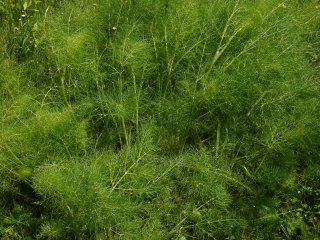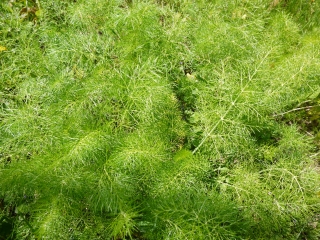home |
science club |
tuxtalk |
photos |
toolbox |
avr microcontroller & DIY electronics |
e-cards |
familyhistory

no preservatives added blog |
herbal treasure chest |
splash into math |
computer and graphics corner |
periodic table
fennel (foeniculum vulgare)

how to grow:
Fennel can be grown from seeds. Fennel is a perennial that is hardy in US zones 5-11+. In our zone 5 Montreal garden we need to especially protect our fennel during the winter. But this causes other problems, as then mice and other animals find it to be a cozy place to spend the winter. So it is always a good idea to save some extra seeds when you harvest them in the fall just in case the fennel didn't survive the winter.
medicinal properties:
If I have a cough I will often drink a tea prepared from fennel seeds. It depends a bit on the cough, sometimes thyme or horehound tea are better, I usually listen to what my body tells me to drink. But drinking a cup of fennel tea or chewing on some fennel seeds is a good way to calm my coughing down.
Fennel helps with coughing and bronchitis. It helps break up chest congestion and makes breathing easier
Fennel tea is also recommended for digestive disorders such as heartburn and gas or stomach discomfort.
Sometimes midwives recommend fennel tea to breastfeeding mothers to stimulate milk flow or to relieve colics in young infants. Consult with your healthcare provider or midwife before using it too.
The tea is also good to relax pain from menstruation.
Fennel is also said to help with gum problems.
Some books also claim that fennel tea is good for helping with fluid retention like swollen ankles.
Another area it is used for is urinary tract infections.
Used externally it can be used on the eyes to soothe conjunctivitis and inflamed eyelids.
And as an oil it eases muscular and rheumatic pain.
You can either eat the seeds or prepare a tea from the ground seeds. Take 1 tablespoon (15g) of ground seeds for 1 cup of boiling water and let it steep for 10 minutes.

Fennel contains anethole and fenchone as its main constituents that give it its healing properties.
cautions and possible side effects:
- Avoid fennel when you know that you can easily develop blood clots.
- Large amounts of fennel seed oil can be toxic to the liver.
- Pregnant women and breastfeeding mothers should avoid fennel oil.
- Big amounts of the seed oil might also lead to seizures or epileptic like convulsions.
- A few people might have an allergic asthma reaction.
- Fennel might make the intake of birth control pills less effective so if you drink fennel tea you need to protect yourself through another way from becoming pregnant.
further reading:
- The Herbal Handbook: A User's Guide to Medical Herbalism by David Hoffmann, ( Healing Arts Press; 3rd Edition, Revised Edition of The Herb User's Guide edition (Feb. 1 1998), ISBN-13: 978-0892817825)
- A Russian Herbal: Traditional Remedies for Health and Healing by Igor Vilevich Zevin, (Healing Arts Press (1997),ISBN-13: 978-0892815494)
- 20,000 Secrets of Tea: The Most Effective Ways to Benefit from Nature's Healing Herbs by Victoria Zak, (Bantam Doubleday Dell Publishing Group Inc (Dec 1 1999), ISBN-13: 978-0440235293)
- The Green Pharmacy Herbal Handbook: Your Comprehensive Reference to the Best Herbs for Healing Paperback by James A. Duke, (Rodale Books (Nov. 18 2000), ISBN-13: 978-1579541842)
Copyright © 2004-2026 Katja Socher, tuxgraphics.org



